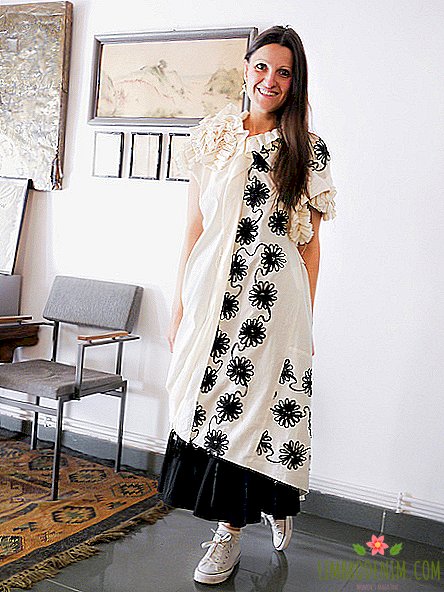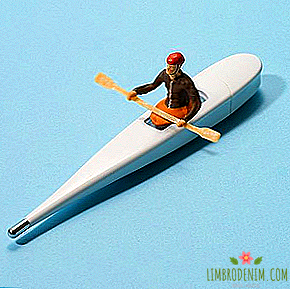Journalist Dazed and i-D on how to make a career in Russian culture
IN RUBRIC "Case"we introduce readers to women of different professions and hobbies that we like or are simply interested in. This time we talked with Anastasia Fedorova - a regular contributor to the iconic western editions of i-D Magazine, Dazed, Broadly, The Calvert Journal, Amuse, The Guardian and others. She told how she helped post-Soviet culture to find a response in the West, why the Russian youth satisfied the global demand for exotic things and where you can live on the freelance of the most fashionable magazines.
Studying in St. Petersburg and London
I always wanted to write - journalism became a compromise when it became clear that you could not live on texts about literature. In the second year at St. Petersburg State University, I began working in the publication Be-in.ru and left there only after bachelor's degree. At the same time, I dreamed of writing abroad: as early as 18 years old, buying Dazed & Confused during my trips to Finland, I imagined how I would cooperate with them.
After SPSU, I spent a year on freelance, and then applied to the University of Westminster, where there was a large scholarship fund at the Faculty of Journalism. I didn’t really try, but in some unimaginable way I entered and even received a scholarship - this is strange, considering that usually this requires an active political or social position. But I just honestly said that I was going to work in a cultural environment; I think I was lucky because people from Russia simply didn’t want to go there.
I moved to London and studied in a magistracy just a year - everything was aimed at practicing. They explained to us how to work in the studio on radio and TV, how to impose materials and everything in this spirit. I was not particularly interested, because I saw myself only in print journalism. Although the university helped to switch to another language in many ways, to master the Western formats, which are very different from the Russian ones, in general, London and its inhabitants influenced me much more. I wanted to live in this city much more than study.
Rubchinsky and The Calvert Journal
After university, I got a job as an assistant editor at The Calvert Journal, which had just opened. I managed to learn a lot, especially when the editor-in-chief was the legendary Eco Eshun - the youngest employee of The Face magazine, the editor of the men's magazine Arena and the art director of the Institute of Contemporary Art in London. In a few years of working at The Calvert Journal, I found something that really interests me and was able to look at Russian culture in a global context. Most of the time I worked with authors and photographers: I ordered texts, I searched for new names, but then I began to write more and more myself.
The beginning of my work in western journalism coincided with the rise of Gosha Rubchinsky's career. After that, the post-Soviet aesthetics began to interest those around them more and more, but even in publications like Vice and Dazed & Confused, no one understood this. So, as a person from Russia, I was asked to understand these topics. The publications were pulled in a string, because on the Internet it is very easy to find the person whose text you liked.
I met Gosha Rubchinsky in an interview back in 2010 and spoke with him for various publications several times more when he became known to the whole world. I learned many interesting guys from Russia and Ukraine through working for The Calvert Journal, we became friends with many. It seems to me that there is nothing better for cultural journalism if you find an important hero and keep in touch with him, thereby getting the opportunity to talk about his work from the inside.
Cultural imbalance and cold war
There is a perception that the Internet has connected all countries into a global space and now you can freely get acquainted with any culture. But this is not quite the case: in the field of view of the hyip publications, there is always a limited number of projects that are usually done in Western Europe or the USA. I had the opportunity to try to help balance this unbalanced situation and show that every culture is good and interesting. I was lucky: I had a background that many other Western journalists do not have. On this you can make a brand of your name, but I try not to lock on one thing.
I love the text for i-D magazine about the Russian Attraction Party organizers team. I came to Moscow on purpose to talk with its creators Rita Zubatova and Yura Katovsky. Our conversation fell right on the 25th anniversary of the coup, on this day it was particularly cool to discuss the new Russian identity in the global world. It is always interesting to be engaged in Ukraine - its music scene and fashion. A very special energy reigns there, and one of the most inspiring characters now is designer Anton Belinsky. I also gladly wrote a text about the appropriation of the aesthetics of the working class and how ethical it is to make it mainstream.
Post-Soviet aesthetics has become at the same time unusual for the western audience, but for some reason very familiar. Probably because global fashion has been looking for an alternative look for a long time, and this fits well with the trend. Eastern European life is romanticized at the same time and carries a raid of rigidity during the Cold War: "Poor, but sexy" - this is how Europe perceives Berlin, and the post-Soviet wave, perhaps, too. This is something provocative and exotic, but at the same time moderate and not shocking. Gosha Rubchinsky works with this exotic and stereotypes: his first collection is called "The Evil Empire" - very ironic and at the same time hyipovo. He does not break any Western framework, but only rethinks them.
There is a difference between what is interesting for Russians and what can work in the global market. Sometimes it is interesting for editors to publish things that everyone has known for a long time. Suppose if they need a story about Greece — this is a crisis, if Russia is something about Putin, if Ukraine, then this is a revolution right away. The political component plays a huge role even in a cultural environment. But at the same time, it is culture that can destroy political stereotypes. Thanks to visual images, people can take a new look at an alien and seemingly hostile country, understand that in Eastern Europe there are also young people who listen to the same music, wear the same things, know the same names. Of course, fashion and art influence the global situation positively, even if it is not so obvious.
Russian fashion journalism pays less attention to its designers, because they simply cannot physically look at themselves from the outside and exotise their culture. In addition, we have a vivid idea of fashion as something luxurious, ideal, conventionally feminine. In the West, fashion holds a political message for a long time, and ideas about it as something primarily attractive have long died - just look at the work of Ray Kawakubo.
Digital nomad and nice work
I recently switched to freelancing and began to travel a lot, experimenting with the digital nomad lifestyle (literally "digital nomad", that is, the one who does not care where to live, just to have access to the Internet, where you can work. - Ed.), which is now widely known. This is a great experience: for example, now I live in Athens. It is not as expensive as in London, so it is quite possible to live on fees. In Britain, of course, it’s harder and harder to get by without permanent earnings.
It is also influenced by the fact that Western publications value good texts and pay them pretty well - photographers complain about low fees much more often. This is the difference with Russia, where, according to my feelings, visual content is valued more, and the text often exists, just to fill the empty space on the site. But even here there is a problem with the fact that they will pay little for creative projects or not at all. It is good that more and more activists are appearing who insist that even pleasant work should not be free.




